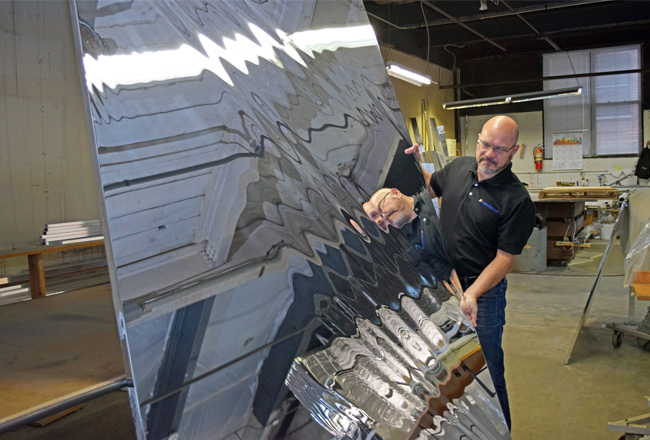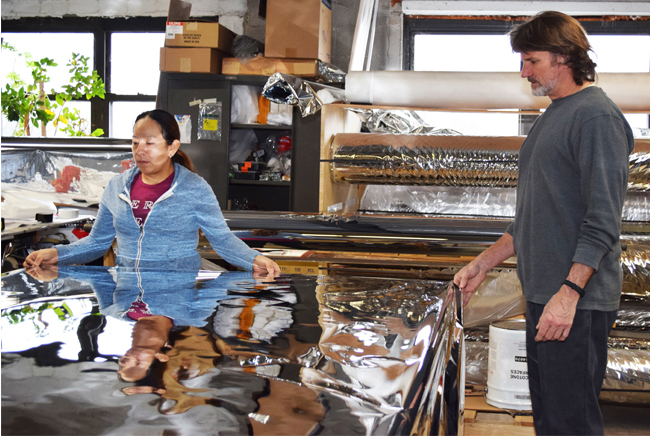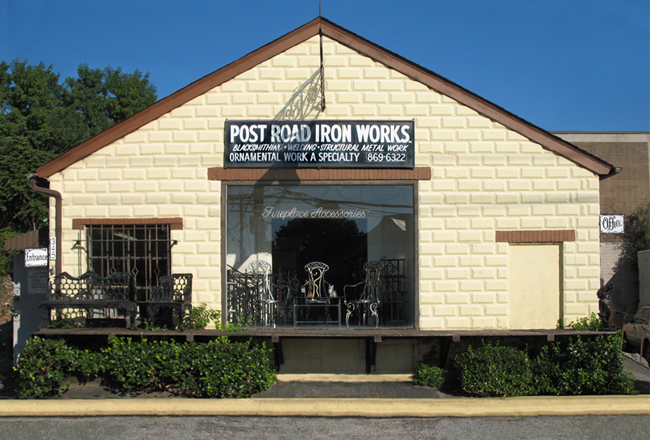
Owners Rick Powers and Benito Repollet have operated their company, LiteMirror, out of a warehouse across from the Irvington train station for a decade.
As the name suggests, the company manufactures reflective mirrors. However, unlike traditional mirrors, you won”™t be in for seven years of bad luck if you happen to drop one of its products.
LiteMirror”™s creations are lightweight, glassless mirrors made from a highly reflective optical film. At the company”™s facility at 2 S. Astor St., the flexible film is stretched around an aluminum frame, then sealed using heat to remove any wrinkles or dimples. The resulting mirror offers a bright, clear reflection without some of the downsides of glass.
“You can only do so much with glass mirrors,” said Donna Powers, an employee of the company and wife of its co-owner. “You can”™t put them on wheels, you can”™t put them on ceilings, so these mirrors are creating a whole new application. You can do anything with them and they”™re clearer and brighter than plate glass.”
These mirrors, which can be custom made to any shape or size, are also a safer alternative to traditional mirrors because they will not shatter or break into shards when impacted.
“You can put these anywhere you can think of putting a mirror that you couldn”™t before because you were afraid it might break,” Donna said.
They are also much lighter than their glass counterparts. A 4-by-6-foot glassless mirror panel weighs roughly 10 pounds, while a glass mirror of the same size weighs around 72 pounds.
“To mount one of these on the wall takes four little screws,” Rick Powers said. “There”™s no heavy lifting.”

Costing about $24 per square foot, the glassless mirror can be an attractive alternative for gyms, dance studios, community centers, sports training facilities and theaters.
Though the film surface is durable, it can be damaged. An object striking the film could leave a dimple or wrinkle in the reflective fabric, though those can be remedied with the application of a head gun or blow dryer.
The film could be slit by fingernails or another sharp object.
“If someone punctures it, you can get it resurfaced,” Rick said. “They can last forever, indefinitely.”
The Irvington mirrors have also been used in warehouses with heavy machinery to prevent injuries.
“Injuries happen because you can”™t see where you”™re going, so if you had these mirrors hanging on the ceilings, workers (operating heavy machinery) could look up and be able to see better,” Donna Powers said.
Golf professionals and instructors also use the mirrors, which can be mounted on wheels. “They roll them out to train people how to do their golf swing,” Rick said. “If the ball hits it, it”™s just going to bounce off.”
The mirrors are also commonly placed around the interior of equestrian centers. “If it was glass, if it fell, horses could get injured,” Donna said. “With these mirrors, no one is going to get hurt.”

They can also be used in batting cages, classrooms, physical or speech therapy offices or in a client”™s home.
“Beyoncé bought a whole bunch of these mirrors when she was training for her tour,” Donna said. “Lady Gaga bought them for her dancers when she was doing the Super Bowl last year.”
“We also did mirrors for Shakira,” Rick added.
At LiteMirror, the company is building on a legacy started by Eugene Martinez, who first patented the glassless mirror in the 1970s. His company, Hudson Photographic, constructed the reflective surfaces as an alternative to the fragile, heavy mirrors used in the production of large screen projection televisions.
“It”™s a big difference for shipping, for handling, for moving,” Repollet said.
Both Powers and Repollet worked for Martinez on South Astor Street for years, Repollet in quality control and Powers on the assembly side of the operation as a plant manager. When Martinez died in 2007 and the business ultimately closed, the two friends said they were left wondering what their next career move should be.
“Benito and I looked at each other and said, ”˜Do you want to open up a pizzeria?”™” Powers recalled.
“Or a cookie shop,” Repollet interjected.
For Repollet, working at the plant was the only career he”™d ever known. It was the first job he found when he arrived in the U.S. as a 24-year-old from Puerto Rico in 1987.
With that background, the two decided to invest their own money to open a business in 2008 in the same building that formerly housed their predecessor Eugene Martinez”™s company.
“Somebody said to us, ”˜Why don”™t you just do what you know?”™” Powers said. “Because including us, there are only two manufacturers of this mirror in the U.S., so why not?”
According to patent records and LiteMirror”™s owners, Martinez”™s original patent for the glassless mirror has expired. The other manufacturer of the product is the similarly named MirrorLite in Peekskill. That company was also started by a former longtime employee of Hudson Photographic more than a decade ago.
Following the decline in sales of projection televisions, LiteMirror began searching for new uses for its product.
“We started selling to dance studios, home gyms,” Donna said. “We tried looking for another application for the mirrors.”
That search continues today.
“I think there is such a huge market here in the U.S. that”™s so untapped, it”™s just a matter of getting the word out,” Donna said.
To help with that, she has worked in sales and marketing for her husband”™s company since its inception. Last year, she decided to join the business full time.
“It”™s just the question of how you introduce a product that”™s been in the market for years,” she said. “But it now has a whole new application.”






















